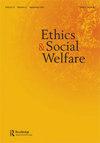在社会工作实践中促进尊严和权利的职业界限
IF 0.9
Q4 SOCIAL WORK
引用次数: 1
摘要
在这篇文章中,我提出了我对服务使用者和社会工作者之间专业关系边界问题的一些想法。作为一名社会工作专业的研究生,我有机会在我的一门课程中以国际视角讨论道德困境。美国北卡罗来纳大学教堂山分校的Kim Strom教授是一位提供国际视野的客座教授。这些讲座提供了一个全新的视角,提出了许多关于社会工作中粗细界限的问题——特别是当我们按照斯洛文尼亚社会工作的现行指导方针进行社会工作时,要求我们通过与服务使用者的对话共同创造解决方案,记住服务使用者实际上是经验丰富的专家。通过这种方式,工作关系旨在培养社会工作者和服务使用者之间的伙伴关系。在这篇文章中,我想挑战社会工作中刚性边界的想法,并探索流动边界的可能性,记住边界应该反映其主要目的,我认为这是为了保护人类的尊严。本文章由计算机程序翻译,如有差异,请以英文原文为准。
Professional Boundaries that Promote Dignity and Rights in Social Work Practice
ABSTRACT In this essay I present some of my thoughts on the issue of boundaries in the professional relationship between service users and social workers. As a graduate student of social work, I had an opportunity to discuss ethical dilemmas in an international perspective in one of my courses. A guest professor, who provided international perspectives, was Prof. Kim Strom from UNC at Chapel Hill in North Carolina, USA. The lectures offered a fresh perspective that raised many questions about thick and thin boundaries in social work – especially when approaching social work by following prevailing guidelines for social work in Slovenia requiring us to co-create solutions through dialogue with service users, keeping in mind that service users are actually the ones who are the experts from experience. In this way, the working relationship seeks to foster a sense of partnership between social workers and service users. In this essay I would like to challenge the idea of rigid boundaries in social work and explore the possibility of fluid boundaries, keeping in mind that boundaries should reflect their main purpose, which I believe is to protect human dignity.
求助全文
通过发布文献求助,成功后即可免费获取论文全文。
去求助
来源期刊

Ethics and Social Welfare
SOCIAL WORK-
CiteScore
1.60
自引率
20.00%
发文量
36
期刊介绍:
Ethics and Social Welfare publishes articles of a critical and reflective nature concerned with the ethical issues surrounding social welfare practice and policy. It has a particular focus on social work (including practice with individuals, families and small groups), social care, youth and community work and related professions. The aim of the journal is to encourage dialogue and debate across social, intercultural and international boundaries on the serious ethical issues relating to professional interventions into social life. Through this we hope to contribute towards deepening understandings and further ethical practice in the field of social welfare. The journal welcomes material in a variety of formats, including high quality peer-reviewed academic papers, reflections, debates and commentaries on policy and practice, book reviews and review articles. We actively encourage a diverse range of contributions from academic and field practitioners, voluntary workers, service users, carers and people bringing the perspectives of oppressed groups. Contributions might include reports on research studies on the influence of values and ethics in social welfare practice, education and organisational structures, theoretical papers discussing the evolution of social welfare values and ethics, linked to contemporary philosophical, social and ethical thought, accounts of ethical issues, problems and dilemmas in practice, and reflections on the ethics and values of policy and organisational development. The journal aims for the highest standards in its published material. All material submitted to the journal is subject to a process of assessment and evaluation through the Editors and through peer review.
 求助内容:
求助内容: 应助结果提醒方式:
应助结果提醒方式:


